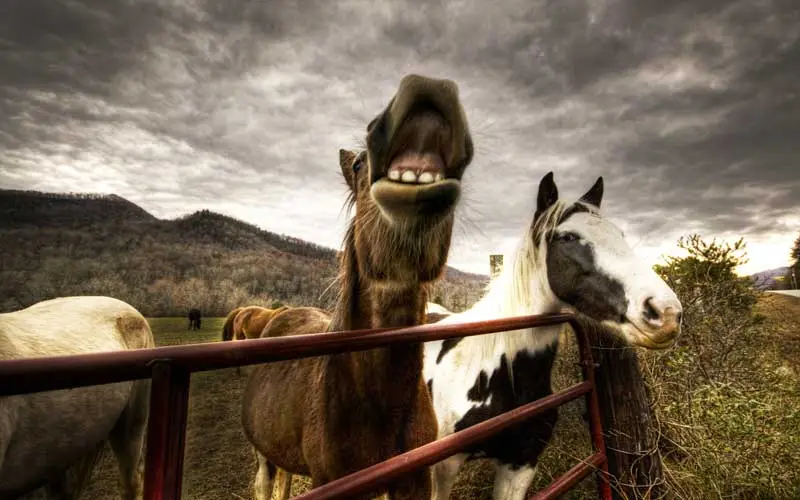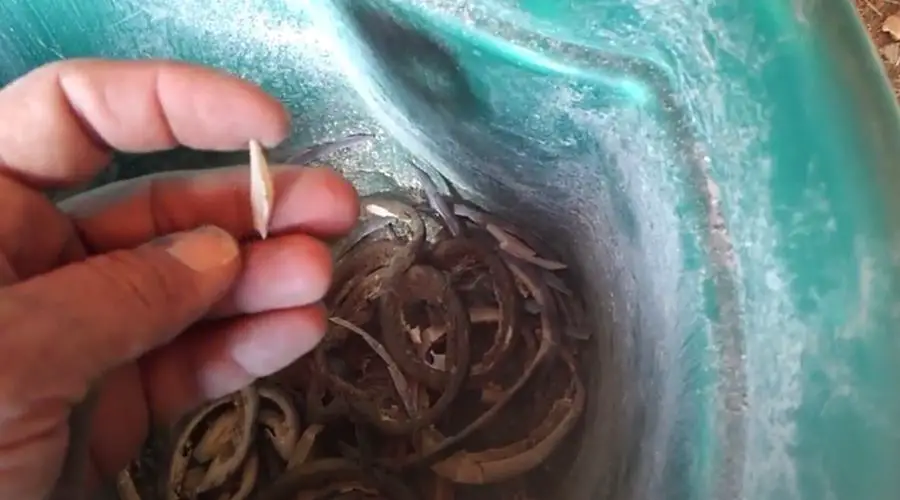Did you know that horse teeth keep growing throughout their life? Unlike other mammals, horse teeth do not only have one change. Their teeth grow continually, and this is why you can easily tell a horse’s age by checking his teeth.
Their teeth grow continually because they are herbivorous animals and their teeth are made for chewing forage and grass.
Horses spend between 8-12 hours chewing and this makes their teeth worn out. Therefore, their teeth grow continuously so that they can feed correctly.
In this guide, we will find out more about why horses keep growing, how fast they grow, and when they stop growing. Let’s dive in!
Do horses’ teeth ever stop growing?
Different animals have unique teeth depending on the food they eat. The common thing with all domestic animals is that they have two sets of teeth in their life like human teeth. They develop deciduous teeth that fall out and then permanent teeth (adult teeth) grow.
Horses have 24 deciduous teeth (milk teeth), which appear within 2 weeks of birth. A male horse has between 40-44 teeth while in females they range from 36-40. The difference between the teeth is because of the canines that appear in male horses from 4-5 years.
Horses’ teeth never stop growing. Their teeth continue to erupt throughout their life, especially in a young horse. The teeth do not necessarily grow. The teeth push more through the gum line as they grow. Their teeth also wear out constantly on the chewing surface as they eat their food. That is why their teeth continue to grow throughout their life.
The grinding action causes problems because the upper jaw is wider than the lower jaw. Therefore, the molar doesn’t sit directly over each other. Their first molar also has sharp edges that injure the tongue and cheeks, so they need to be floated.

How fast do horse teeth grow?
When you check a horse’s mouth, you might think they only have front teeth because they are the ones you see at a glance. However, they also have other types of teeth like premolars, canines, incisor teeth, molars, and wolf teeth.
These teeth keep growing in young horses and older horses.
The teeth grow about 1/6 inches per year. The amount of wear in the teeth varies because of several reasons. This includes the horse’s genetics, health, habits, or the type of soil he is grazing.
See also: If you’re struggling to connect with your horse, this article is for you. Learn why horses may not like you and what you can do to fix the issue.
At what age do horses’ teeth stop growing?
When a foal is born, they begin to develop baby teeth when they are about 8 months old. These teeth are later replaced by adult teeth when he is around 2 ½ years old. By the time he is 5 years, he has completely developed a set of permanent teeth.
Their teeth continue to grow throughout their life.
However, it reaches a point where he lives long and the teeth are long enough. The teeth eventually stop growing and they get worn out to the nibs. When they reach that point, he requires an extruded pre-chewed senior feed.
See also: If you’re thinking of buying a horse, you’re probably wondering why they’re so expensive. Here are 11 reasons why horses are pricey, plus tips on how to save when buying one.
Why did horse teeth get bigger?
The main reason why horse teeth changed and became bigger is because of changes in climate and diet. Dating back to 33 million years ago, the teeth of horses changed noticeably. 18 million years ago, ancient horses’ teeth changed remarkably and their molar surfaces became complex to aid in chewing grasses and other tough plants.
Additionally, the teeth started to become taller. All these changes are associated with the increase in grasslands which made horses eat grass. Their teeth height also grew taller to respond to the colder and harsher climate that resulted from the spread of grasslands.
The last 4-5 million years ago, they started eating a highly abrasive grassy diet. This has been the norm for modern horses up to date. So, their dentition has greatly evolved and this has helped them to graze on abrasive grass. Their cheek teeth grind the grass in preparation for digestion.
Conclusion
There is a lot you need to know about horse teeth. First, their teeth keep growing, and this makes it possible to tell a horse’s age. Because of their continuous grinding action, their teeth wear out, and that is why they constantly grow throughout their life.
In the case of wild horses, they feed on the grass with more moisture content. Therefore, their teeth do not grind more compared to domestic horses.
They also suffer from dental problems like gum disease, tooth decay, or missing teeth. Their teeth also develop sharp edges that require floating to prevent mouth injuries.
That is why it is recommended to maintain good oral health and dental care to prevent periodontal disease and any other dental issues. You can do horse care at home or let an equine dentist do it for you.


![7 Horse Treats Without Molasses [Quick & Important Facts]](https://mammalpedia.com/wp-content/uploads/2022/09/Alfalfa-pellets-vs-Grain.webp)
